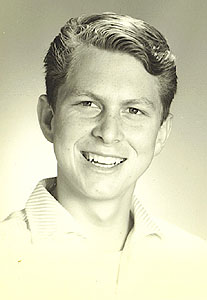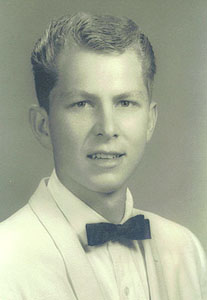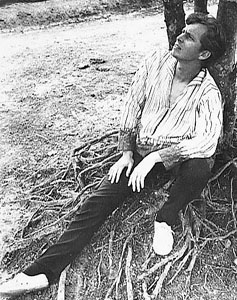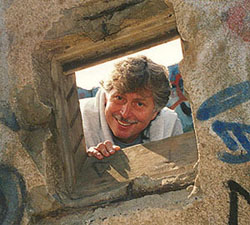As Clayton Bess I write books about young people in trouble, and so it makes sense that a
young person in trouble might be attracted enough to one or more of my books that he or she might actually come to my
website. And if you are reading these words, that may mean you.
But of course two powerful questions here are, “What can I possibly know? And what practical advice can I possibly give
you?”
Make a friend of a Librarian

First Grade
That may sound corny, but it’s really good advice. Librarians are usually very accessible personalities. Just go down to
the public library and look around at who is working the floor.It is probably a Reference Librarian and, hopefully, a
Children’s Librarian; these people are there to answer your questions. Period.
Well, no, that good sentence goes on... Librarians are there to answer your questions and they are “neutral providers of
information”. In other words, librarians don’t give you any attitude.
But don’t just take my word for it. You might be in a library right now and on one of the library’s computers, reading
these words. If so, look around and find a librarian working at the Reference Desk or the Children’s Desk and bring that
librarian over and show him or her these words and ask if this is true or not true. (Make sure you get one that’s not super
busy because you’re going to want this person to take some time to evaluate all of this, and you, too.)
Librarians don’t just help you to find good books-although that’s important enough-but they help you to find whatever
kind of information you need. You need to find out about a problem? Big problem, small problem? Lack of love and
understanding? Feeling alone? Abused?
A librarian will probably understand, and a librarian will probably help. Librarians are highly educated, professional
people. In the course of their daily work they run into a lot of different people with a lot of different problems, and
their professional code of ethics, as defined and upheld by the American Library Association, is to be “neutral providers
of information” to anyone who approaches them in the library.
Top of Page
A Good Book

Fifth Grade
A librarian can provide you with a good book. A book can be a friend. You can cuddle up with a book and read the same
sentence or paragraph or page or chapter all night long, if you damn well want to. Books for young people, particularly,
can be helpful because the authors of these books are trying to help you to understand the adult world as well as the kid
world or teenage world-which are, in fact, three different worlds that are always colliding. You can learn a lot about how
to keep your own sanity by reading a good book that has to do with your particular problem. And a librarian can help you
find that good book, and the librarian is supposed to know to keep his or her mouth shut about it.
A word of warning about librarians, however. You’ll find for the most part that librarians are very friendly,
understanding people, but if they find out about a case of abuse, then they are bound by law to report it. That may bring
in the police or various other social services available in our society. Maybe you think your own problem doesn’t merit
police interference? That’s going to be up to you to decide, but you’ve got to decide it before you expose abuse to a
librarian (or teacher, or principal or other professional adult working with young people, who are all bound by the same
law to report abuse.)
Top of Page
Abuse
It’s a fact of life that some kids have a better or worse living situation than other kids. Some kids are born smarter
or wealthier or better looking or more athletic or just better at certain things than other kids. So what? We’re all going
to live and die on the same planet, and so we need to muddle our way through our own personal situation in life.
Some kids face abuse, and abuse comes in a huge variety. It may be verbal abuse, physical abuse, or sexual abuse. Abuse
may come periodically, monthly, weekly, daily, hourly. It’s different for everybody, but you’re going to face abuse at
least a few times in your young life, for whatever reasons, and by whomever. Some of it is easy to shake off; some of it
you may never shake off.
Top of Page
Verbal Abuse
The best thing to do is just shake off verbal abuse. It’s only words. Don’t let the words hurt you, and don’t let them
define you. You are in charge of the words; the words are not in charge of you. Abusive language comes from other people
who are probably pretty stupid and pretty mean. At the very least, those people are insensitive, and you probably don’t
want to be like those people. So just shake it off and walk away free.
Verbal abuse from parents and teachers and other adults is sad, sadder for them than for you because they’re old enough
to know better. They should have found out by their adult age that there are so many better ways to treat kids and help them
to learn than to abuse them verbally.
Verbal abuse from your peers is more understandable because kids, while growing up, go through a lot of changes that can
sometimes make them pretty mean and irrational. That’s why it’s best to just shake it off. You might even try to be friends
with the other kid who is being abusive. Sometimes it’s just that that kid is having troubles of his or her own and is
trying to take it out on the handiest scapegoat, which may be you.
Top of Page
Physical Abuse
If abuse becomes physical, with pushing, hitting, kicking, threatening with weapons, then you really must report it. It
will only get worse if you don’t. And physical abuse you can’t shake off. You could be hurt for the rest of your life. Best
advice, go to a librarian first. The librarian might get in touch with your parents, or your school, or your teacher or
your principal, or even the police. The librarian may not even know you personally, but the librarian does know the best
place to go for help because sometimes the abuse might even be coming from a parent, or a teacher, or a principal. But
remember, you absolutely MUST stop the abuse before it goes too far-and it most probably will.
Sexual Abuse
If abuse becomes sexual, with inappropriate fondling, unwanted advances, even rape, then again you really must report it.
Otherwise it will no doubt continue and get worse. Abusive people don’t just stop their abuse. You are the one who has to
stop it.
Again, I would go to a librarian. A librarian probably will not have a prejudice against you, personally, as a teacher
or parent might have. A librarian will recognize the real you, the person who is in trouble and looking for a way out. A
librarian is not intricately involved with your everyday life; therefore a librarian can think more clearly about what’s
best for a person like you in a situation like your own.
Top of Page
Gay Teens

Tenth Grade
When I was talking at one high school about The Mayday Rampage a guy named... let me see, perhaps I’ll call him Clayton
to keep him anonymous, but he will know who I mean... named Clayton waited on the periphery of the crowd after my talk until
after everyone had gone on to their next class, and then he approached me. “Can I talk to you privately?”
Well, gee, I was at a loss. “Don’t you have another class right now?”
“Yeah, but the teacher will give me permission if I’m talking to you.”
Well, gee, where could we talk? The sex-ed teacher who had invited me to talk to her classes suggested Clayton and I go
out to this courtyard where there were picnic tables. It was like a fishbowl out there because all the other classes in
session had windows facing onto the courtyard; everybody could see us, but at least no one could hear us.
I was pretty sure that the reason Clayton wanted to talk to me privately was because of a sexual problem, and I was
pretty sure that that sexual problem was going to be homo-sexual. I was also pretty sure that every other student in that
school, watching us through the windows, also knew that we two Claytons were talking about homosexuality.
Clayton was trembling as he launched in. “See, I’m gay. And I know I’m gay. And I’m not bi, or anything else but gay. And
I’m never going to be anything but gay. I’m gay.”
I listened to him go through his personal problems, and I hope I offered Clayton pretty good advice. He was having
troubles with his boyfriend, and with his father, and with a lot of his peers, but mainly he seemed to be having trouble
with himself. When I found out he was a junior, I told him, “Don’t worry too much about all this now. I know that two years
seem like an eternity to you right now, but these two years are going to be over pretty soon, and then you’re going to be
out of here, and you’re going to find your own friends outside of high school, maybe get an apartment downtown, maybe go to
college, and life is going to bloom for you. You’re going to have fun. You’re going to find yourself. Meanwhile, don’t let
these people get under your skin. You are who you are, and you want that to be the best possible thing that you can be. And
that really has nothing to do with them, unless you allow it.”

Twelfth Grade
Clayton seemed to understand it all, and he seemed to appreciate what I was saying. There weren’t any specific answers
to any specific problems, but just a general point of view about life and living happily that seemed to make sense to him.
I hope so.
The highest suicide rate in our society is among gay teens. Did you know that? Pretty dismal statistic. High school can
be a rough society, and you’ve got to protect yourself throughout at the same time that you try to find every possible way
to enjoy it and benefit from it. Remember, all you have to do is survive; treat it like a “reality show”.
Top of Page
Gay Marriage
And, cheer up. Things are getting better all the time for young gay people in our country. As our nation has begun to
face head-on the issues surrounding gay marriage, there has been a huge step in understanding being taken by our entire
society, together. As all manner of loving gay people have come out and been splashed onto the front pages of our newspapers
and all over our TV screens as they have sought to do a really decent thing—marry someone they love dearly—our
society has finally had the opportunity of seeing the good, human face of homosexuality. And people are changing their
attitudes because of it.
Previously most people learned about homosexuality by only the most negative of stereotypes, either on the streets or in
films. To our society, gay people were at best “weird” but mainly gays were portrayed as sexual predators of the young. Our
society has been ignorant.

Peace Corps, Liberia, West Africa
One of the most hopeful aspects brought to light during this controversy about gay marriage is that young people are far
more accepting of the idea than older people. In fact, teens are more accepting than 20-30 year olds, while 20-30 year olds
are more accepting than 30-40 year olds... and on up the line, with the oldest people in our society being least accepting.
That makes sense. But guess what, those older people—who are not as likely to change their attitudes as younger
people—are going to die off sooner than the younger people. That, unhappy to say so, will be a very good thing for
gay people.
Our society is evolving. When you’ve been alive as long as I have, you can actually see the evolution and measure the
steps of change. Those steps are getting huge, even though it may seem that we are advancing very slowly. If you are a gay
teen, I hope that you will be a positive force in shaping our evolution.
Top of Page
Social Services
Rather than list the various social services to which you might turn for help, I’m just going to suggest using your local
Yellow Pages. But where to look in the Yellow Pages? In the front pages of every Yellow Pages book, you’ll find green pages
that are the index. When you don’t know the correct word to look under in the yellow pages, look in the green pages first.
For example, I just looked in the green pages under “abuse” and found “Abused Persons’ Aid See Crisis Intervention Services...
459.” That means turn to page 459 in the yellow pages and you’ll find about two dozen organizations that will help you,
including WEAVE—Women Escaping a Violent Environment; Sex and Love Addicts Anonymous; Pregnancy Hotline; Volunteers
in Victim Assistance; 24-Hour Crisis Line.
I looked in the green pages under “gay” and found “Gay and Lesbian Organizations”, leading me to nearly a dozen listings,
some of which I had heard of before, including “Men’s Chorus”. Wow. A chorus of gay men. Cool.
In the green pages, I looked for “teen” and found “Teen Violence Intervention” with two separate referrals, “Crisis
Intervention Services” and “Social & Human Services for Individuals and Families”.
Help is available, and an initial phone call is anonymous. Investigate your options. Good luck. Good life.
Top of Page
Maxims To Live By
There are a couple of maxims by which my dad lived, and even though they are as old as the hills, I offer them to you
here as the best way to get through our society’s pitfalls, to keep in mind in every crisis and at every decision point in
your life:

Land’s End, San Francisco
“Live and let live”.
“Say and do to other people as you would like them to say and do to you.”
“Fight the good fight; live the good life.”
“Smile. Be happy.”

Copyright © 2004 Robert Locke
All Rights Reserved
|

